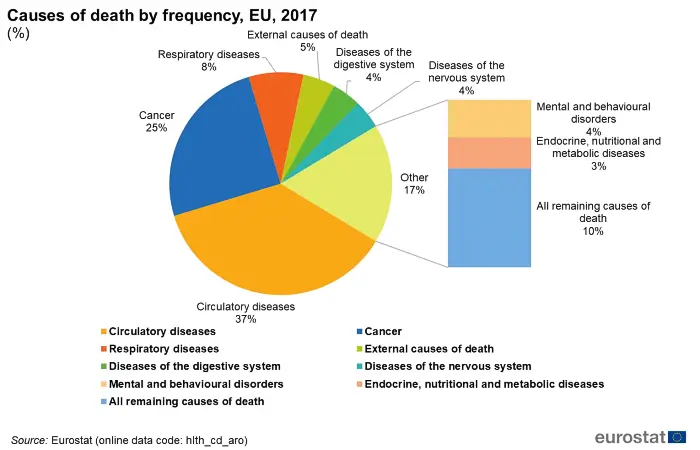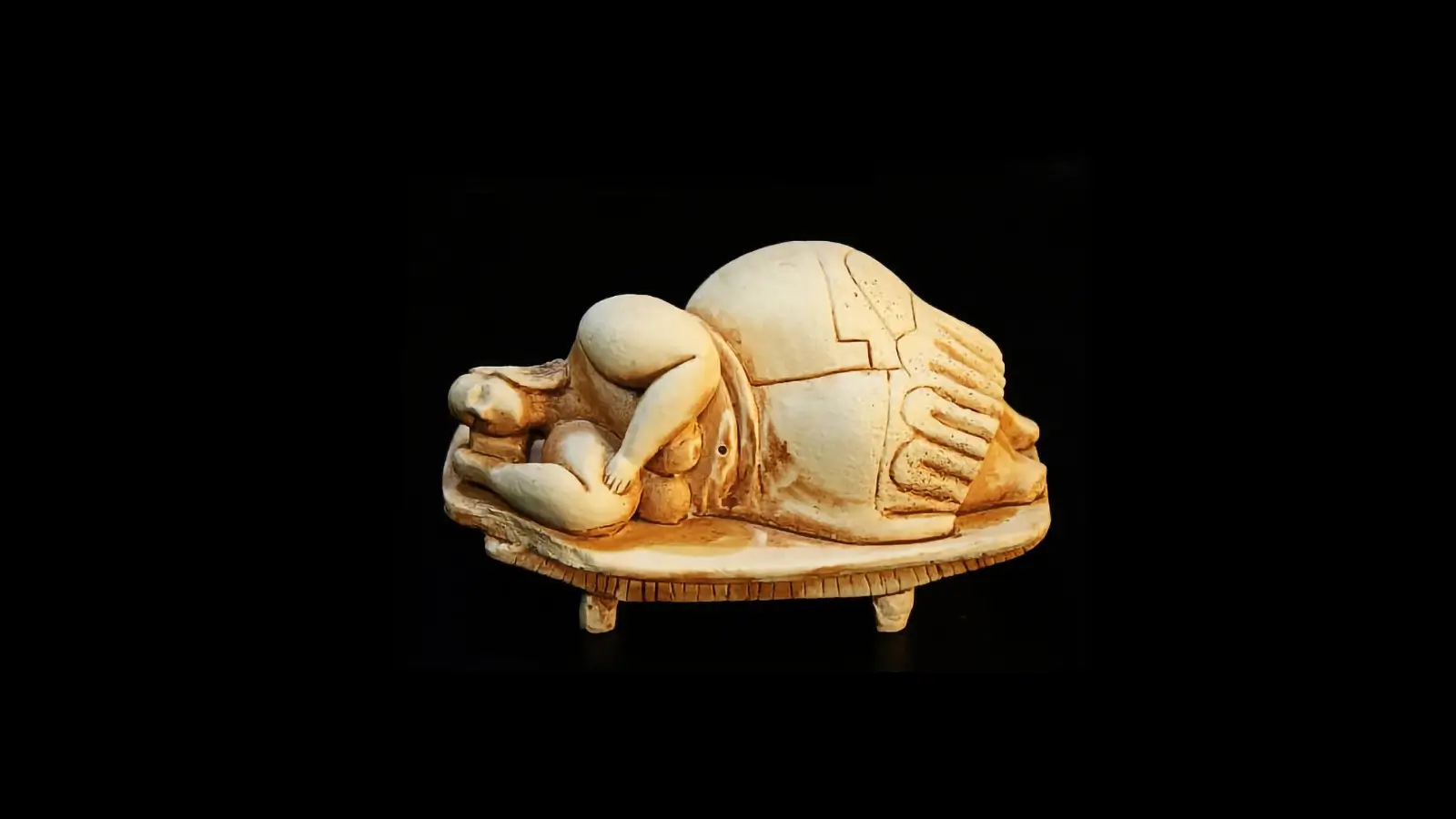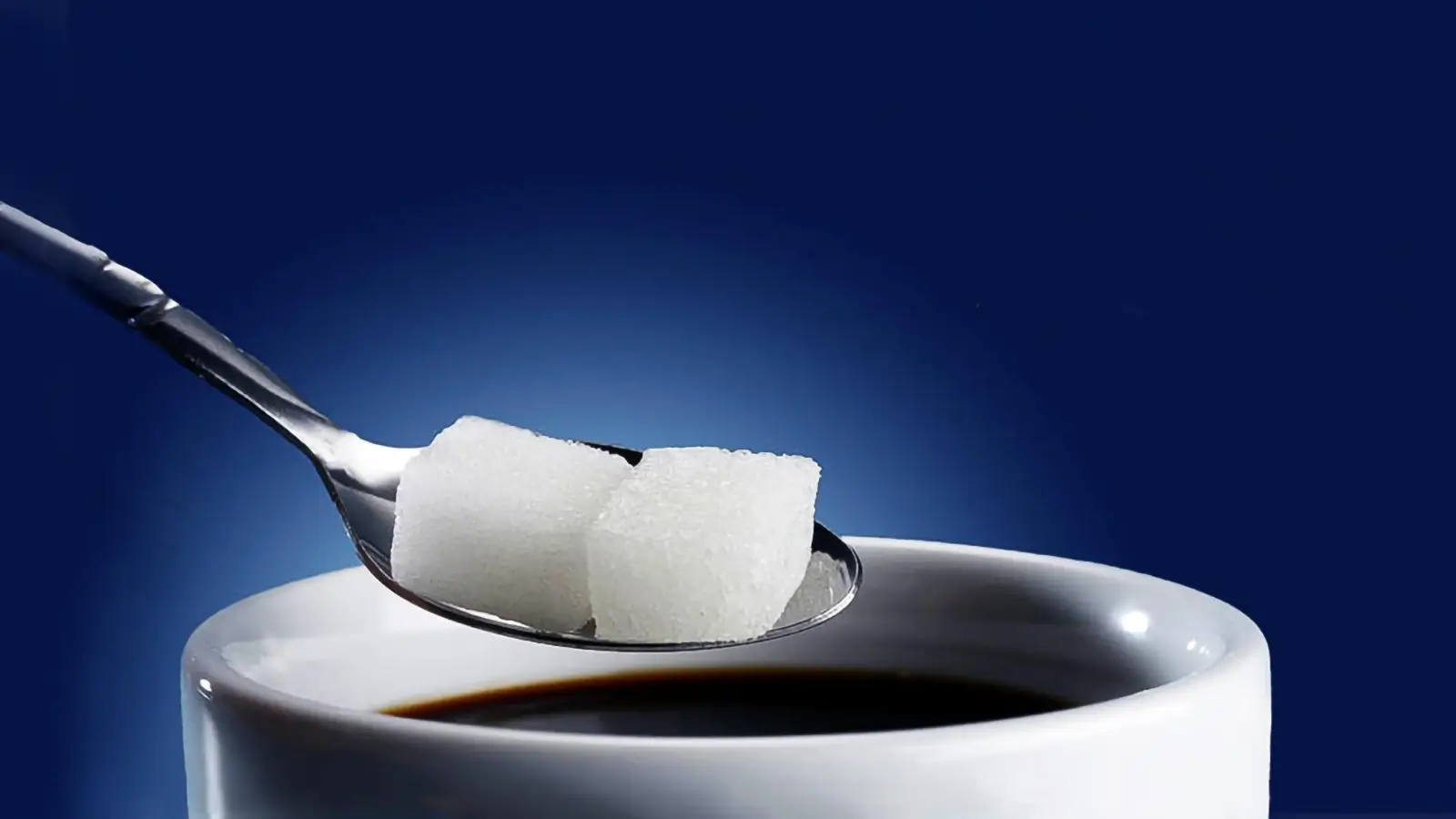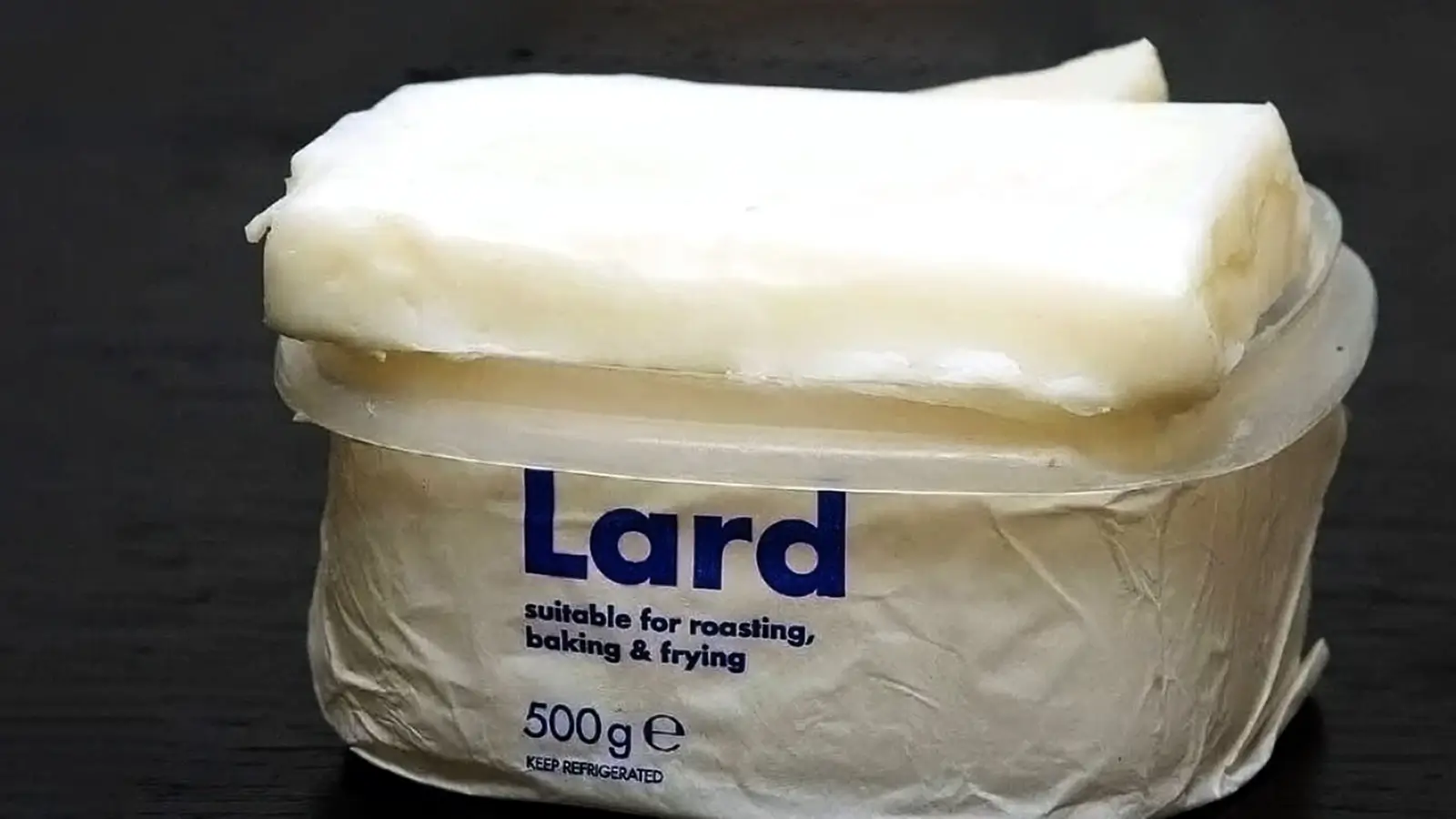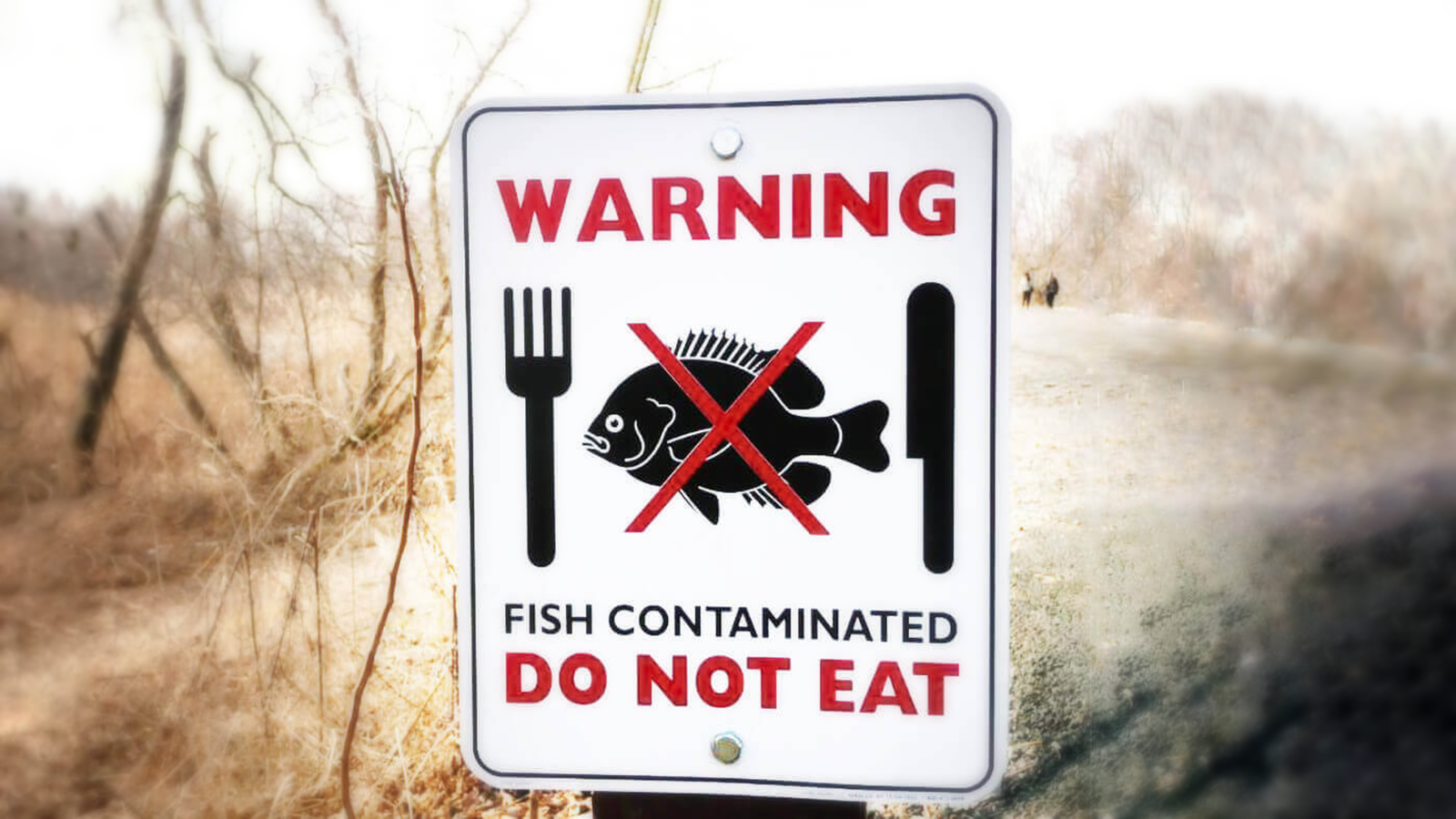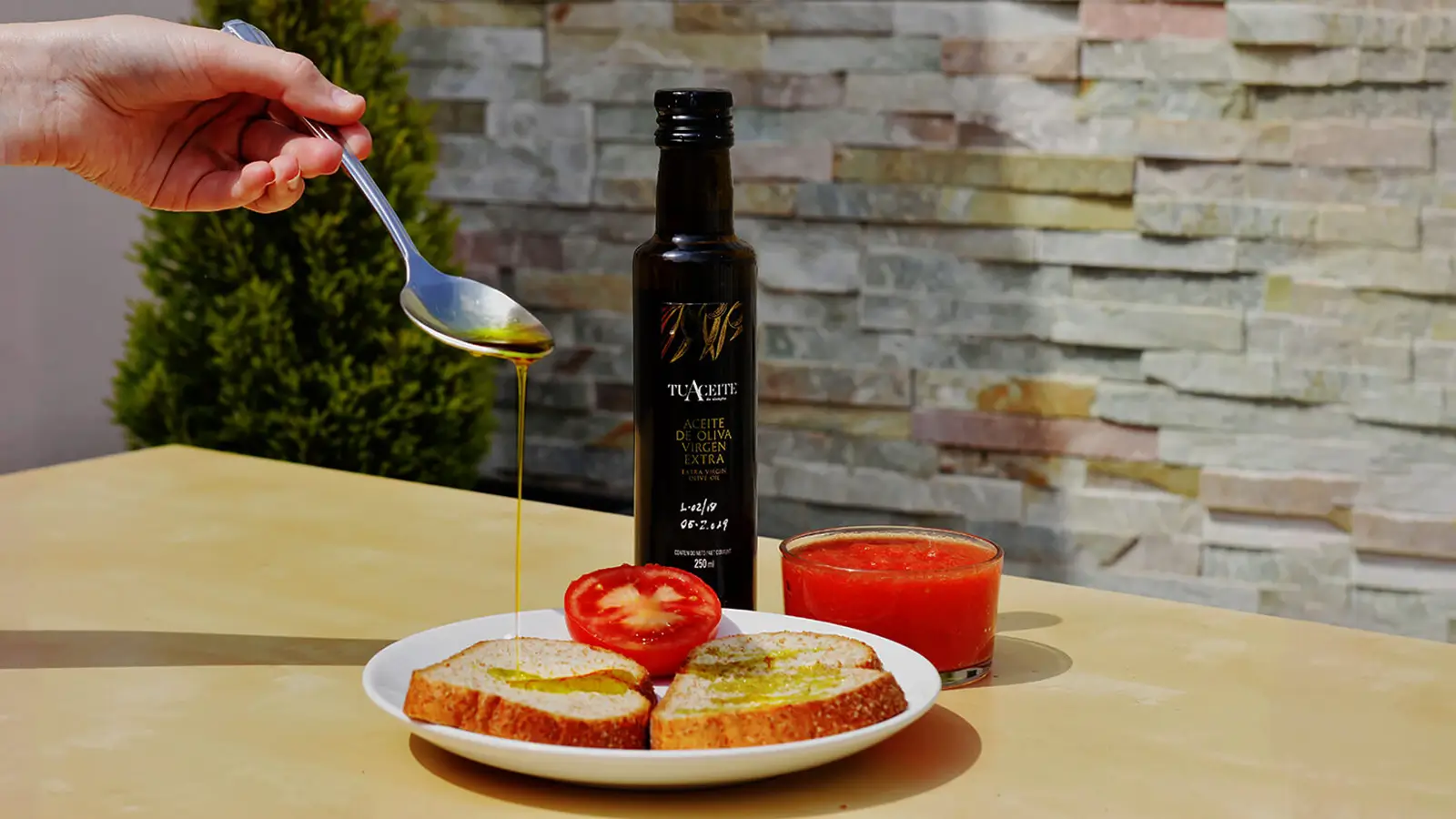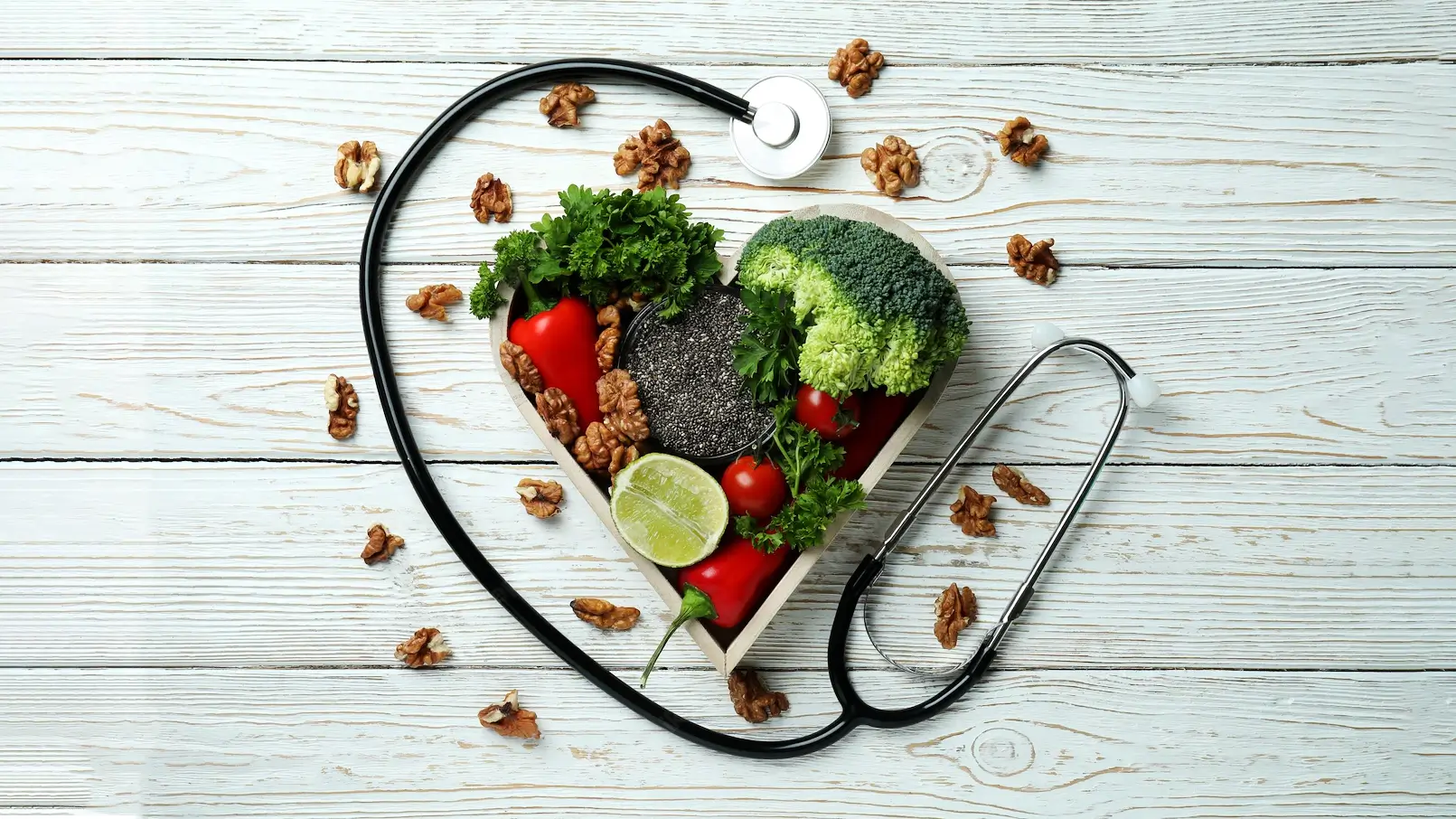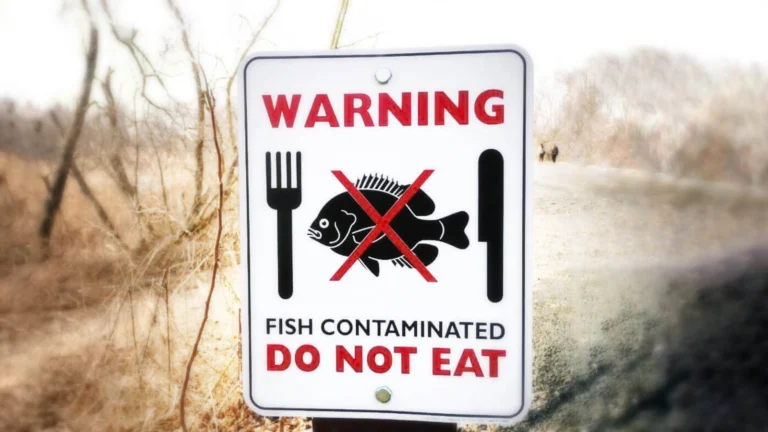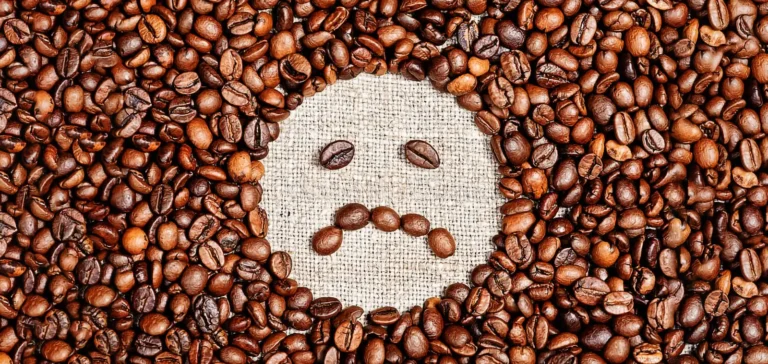Chronic diseases- The root causes
If we disregard the real genetic causes that cause no more than 5% of deaths, the real reason for chronic diseases is an evolutionary incongruent diet.
Milos Pokimica
Written By: Milos Pokimica
Medically Reviewed by: Dr. Xiùying Wáng, M.D.
Updated June 9, 2023Chronic diseases are conditions that last 1 year or more and cannot easily be cured. For most chronic diseases, there are only treatments that can help with the symptoms and most of them will require ongoing medical attention and will limit activities. They are also leading drivers of a trillion dollars in annual healthcare costs. Chronic diseases are the leading causes of death and disability in the world and cause the death of more people in a year than most of the wars in entire human history combined.
Chronic diseases are a wide range of different conditions such as heart disease, cancer, and diabetes and at first, sight has nothing in common. How could such a wide range of different conditions have a common root cause?
It is about genetic predisposition, right? That is a common belief. If we are going to have some disease that is just how it is. There is nothing we can do about it.
The answer is no. If we disregard the real genetic causes that cause no more than 5% of deaths, the real reason is evolutionary incongruent diet and lifestyle. In most cases, the disease is a choice. For example, some level of cancer will be present in animals too, but 23.4% of all deaths just from cancer are not from genetic causes. This is an open secret number one that people just don’t like to talk about. The medical industry will openly avoid this topic also. The medical industry (allopathic medicine) is based on interventional treatments and patented drugs.
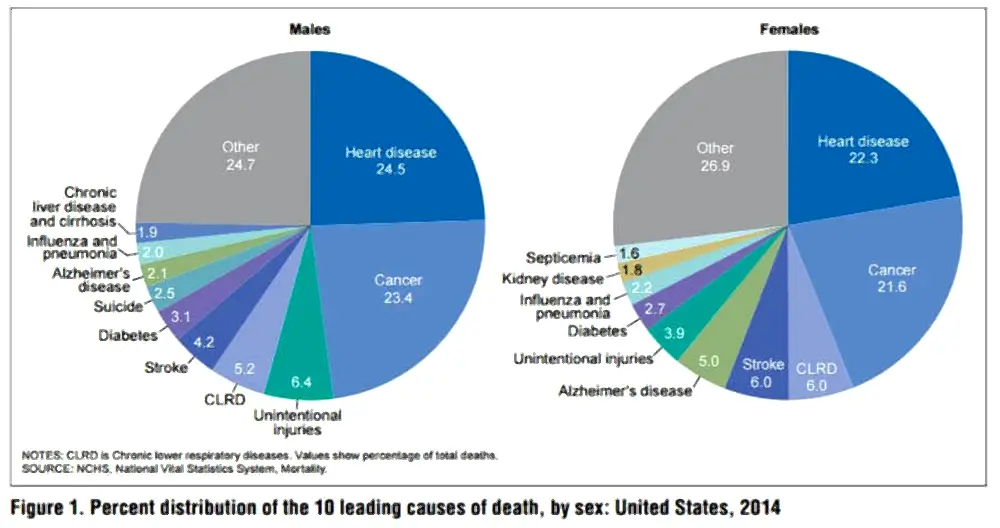
The evolution of the hominin diet is an important topic that plays a role in our understanding of our physiology. Our body is created by more than 50 million years of evolution. Genes are passed from one species to another. That is a reason why some species like chimpanzees have 99% of the same genetic structure as Homo sapiens.
We have to understand how we came into existence and after that what diet and style of living should we have that is going to be in line with our physiology.
Genetical predisposition is only half of the picture. The real reason is an abrupt shift in our diet that has caused maladaptation and as a result, individual genetic predisposition will be a source of one or the other chronic disease. But the root cause is maladaptation. Someone will have diabetes someone will die from cancer and a third person will have a heart attack depending on individual resilience but we all going to die from some of them because we all eat animal products that we are not adapted to eating in high amounts. We could cope with some meat sometimes but not in the excessive amounts that we would like.
Maybe 10 million years from now we would not have to worry about diet anymore because our bodies will adapt but until that time chronic disease can only be prevented with diet and with a lifestyle that is in line with the lifestyle of our hominin ancestors. Meaning physical activity, periodical fasting with normal weight maintenance, avoidance of pollution, and a plant-based whole-food diet. That is what means to have a “healthy” life. It is just a lifestyle that we are adapted to by evolution. Everything can be “healthy” but not everything can be healthy for us.
For example, excess cholesterol causes atherosclerosis (fatty deposits that can clog arteries) and then causes heart disease. Number one killer in the world. We do not need dietary cholesterol (animal products) because our liver produces it. For us as for any other plant either it is not an essential nutrient. Our liver creates as much as we need so any dietary cholesterol at any time in our entire life, one mg of it is excess that needs to be detoxified. Also, no our body does not have to have cholesterol to make every cell in our body, our liver makes all cholesterol we need our entire life every second of it. Why? Because we are not carnivores. Livers of carnivores do not make cholesterol, for them, cholesterol is an essential nutrient. They do not need to because carnivores eat cholesterol in every bite of meat, so they are adapted to eating it by evolution, and we are not. No matter how much cholesterol you feed to your cat she will never develop heart disease. Cats are adapted to eating it in any amount that they want. And we are not.
Eating animal products is therefore associated with shortening life expectancy because our number 1 killer is heart disease and number 3 stroke (basically the same disease as a heart disease just different outcome). If our number one killer is something completely uncorrelated for example bubonic plague-like in the Middle Ages, then we would not have to be worrying about cholesterol at all, we will have to be worrying about sanitation. At this time in our evolution situation is like it is. Cancer is a significantly lifestyle disease too. Genetics plays a role, but lifestyle is as much as important as genetics because of the toxic overload and mutagens from food and external intoxication and also the inherent lack of an adequate level of self-repairing autophagy mechanism (fasting). The very important risk factor in cancer is chronic inflammation and an impaired immune system. Most of the population today has high levels of chronic inflammation. Then there is on a wide population scale the lack of some essential micronutrients (essential and some important non-essential micronutrients, not calories) and antioxidants. On one hand, we have inflammatory compounds, toxins, and mutagens that come from animal products but on another hand lack micronutrients and antioxidants that come from plant sources. Also, then there is a chronic elevation of cancer-promoting hormones like IGF-1 and estrogen. Complete protein that is present in animal products stimulates IGF-1, especially in a high protein-rich diet and estrogen usually comes from dairy. This is just an example, the real list of associations is a never-ending story but it all comes down to an unnatural diet.
Just these three diseases stroke, heart disease, and cancer are causing more than 50% of deaths, and all three are substantially dependent on a diet. When we look at the list of 15 leading causes of death more than 80% are lifestyle influenced.
Everyone in the medical field knows this, all doctors, all scientists, and all industries. Well maybe not all of the doctors, some are just bad. The only ones that have a big problem with this are us, regular people because we like the way we live and we would not like to change anything in the way we eat. We will go to MDs if we have any problems right. Doctors are just there to do their job of prescribing pills. They are not there to care for you. Only you can take care of yourself. The problem is you don’t want to. You want the pill.
We like our dopamine-inducing drugs (supernormal stimuli) in the form of food and any other variation. The most convenient way would be to find some research that is in line with what we like and then use it as an excuse. Then we can go to the medical doctor to get some magic pills.
If we don’t understand the underlying logic of our behavior patterns then nothing can help us, no practical advice will be enough.
Science cannot govern our every act. We must logically govern ourselves and our behaviors in a line of understanding of our history and how we came into existence.
In reality, we need to take a look at the lives of our ancestors over a long time spread than just the paleo period so that we could reconstruct our natural diet.
References:
Passages selected from a book: Pokimica, Milos. Go Vegan? Review of Science Part 1. Kindle ed., Amazon, 2018.
- Sinha, Rashmi et al. “Meat intake and mortality: a prospective study of over half a million people.” Archives of internal medicine vol. 169,6 (2009): 562-71. doi:10.1001/archinternmed.2009.6
- Dinu, Monica et al. “Vegetarian, vegan diets and multiple health outcomes: A systematic review with meta-analysis of observational studies.” Critical reviews in food science and nutrition vol. 57,17 (2017): 3640-3649. doi:10.1080/10408398.2016.1138447
- RYLE, J A, and W T RUSSELL. “The natural history of coronary disease; a clinical and epidemiological study.” British heart journal vol. 11,4 (1949): 370-89. doi:10.1136/hrt.11.4.370
- Chapel, John M et al. “Prevalence and Medical Costs of Chronic Diseases Among Adult Medicaid Beneficiaries.” American journal of preventive medicine vol. 53,6S2 (2017): S143-S154. doi:10.1016/j.amepre.2017.07.019
- Zhang, Yu-Jie et al. “Antioxidant Phytochemicals for the Prevention and Treatment of Chronic Diseases.” Molecules (Basel, Switzerland) vol. 20,12 21138-56. 27 Nov. 2015, doi:10.3390/molecules201219753
- Booth, Frank W et al. “Lack of exercise is a major cause of chronic diseases.” Comprehensive Physiology vol. 2,2 (2012): 1143-211. doi:10.1002/cphy.c110025
- Generali, Elena, et al. “Lessons Learned From Twins in Autoimmune and Chronic Inflammatory Diseases.” Journal of Autoimmunity, vol. 83, Elsevier BV, Sept. 2017, pp. 51–61. https://doi.org/10.1016/j.jaut.2017.04.005.
- Lewandowska, Anna Maria et al. “Environmental risk factors for cancer – review paper.” Annals of agricultural and environmental medicine : AAEM vol. 26,1 (2019): 1-7. doi:10.26444/aaem/94299
- Fardet, Anthony, and Yves Boirie. “Associations between food and beverage groups and major diet-related chronic diseases: an exhaustive review of pooled/meta-analyses and systematic reviews.” Nutrition reviews vol. 72,12 (2014): 741-62. doi:10.1111/nure.12153
- Campbell, T Colin. “Cancer Prevention and Treatment by Wholistic Nutrition.” Journal of nature and science vol. 3,10 (2017): e448. [PubMed]
Related Posts
Do you have any questions about nutrition and health?
I would love to hear from you and answer them in my next post. I appreciate your input and opinion and I look forward to hearing from you soon. I also invite you to follow us on Facebook, Instagram, and Pinterest for more diet, nutrition, and health content. You can leave a comment there and connect with other health enthusiasts, share your tips and experiences, and get support and encouragement from our team and community.
I hope that this post was informative and enjoyable for you and that you are prepared to apply the insights you learned. If you found this post helpful, please share it with your friends and family who might also benefit from it. You never know who might need some guidance and support on their health journey.
– You Might Also Like –

Learn About Nutrition
Milos Pokimica is a doctor of natural medicine, clinical nutritionist, medical health and nutrition writer, and nutritional science advisor. Author of the book series Go Vegan? Review of Science, he also operates the natural health website GoVeganWay.com
Medical Disclaimer
GoVeganWay.com brings you reviews of the latest nutrition and health-related research. The information provided represents the personal opinion of the author and is not intended nor implied to be a substitute for professional medical advice, diagnosis, or treatment. The information provided is for informational purposes only and is not intended to serve as a substitute for the consultation, diagnosis, and/or medical treatment of a qualified physician or healthcare provider.NEVER DISREGARD PROFESSIONAL MEDICAL ADVICE OR DELAY SEEKING MEDICAL TREATMENT BECAUSE OF SOMETHING YOU HAVE READ ON OR ACCESSED THROUGH GoVeganWay.com
NEVER APPLY ANY LIFESTYLE CHANGES OR ANY CHANGES AT ALL AS A CONSEQUENCE OF SOMETHING YOU HAVE READ IN GoVeganWay.com BEFORE CONSULTING LICENCED MEDICAL PRACTITIONER.
In the event of a medical emergency, call a doctor or 911 immediately. GoVeganWay.com does not recommend or endorse any specific groups, organizations, tests, physicians, products, procedures, opinions, or other information that may be mentioned inside.
Editor Picks –
Milos Pokimica is a doctor of natural medicine, clinical nutritionist, medical health and nutrition writer, and nutritional science advisor. Author of the book series Go Vegan? Review of Science, he also operates the natural health website GoVeganWay.com
Latest Articles –
Plant Based News
-
Add These Tofu ‘Taste Cubes’ To Your Next Sandwich
on July 3, 2025
-
Frozen Tofu Just Got A Summer Makeover In This Eggplant Gratin
on July 2, 2025
-
A Day Of High-Protein Vegan Meals – Featuring Homemade Seitan
on July 2, 2025
-
Califia Farms Expands Oat Barista Range With Two New Nut-Flavored Blends
on July 2, 2025
-
Vegan Marathoner To Run Length Of UK For His 60th Birthday
on July 1, 2025
-
These Easy Plant-Based Enchiladas Are Oil-Free
on July 1, 2025
-
‘This Is Our Most Popular Vegan Salad After 20 Years In Business’
on July 1, 2025
Top Health News — ScienceDaily
- A midlife MRI that spots rapid aging and signals disease long before symptomson July 2, 2025
A new brain scan tool shows how quickly your body and mind are aging. It can spot early signs of diseases like dementia, long before symptoms begin. The scan looks at hidden clues in your brain to predict future health.
- The pandemic pet boom was real. The happiness boost wasn’ton July 2, 2025
Locked-down Hungarians who gained or lost pets saw almost no lasting shift in mood or loneliness, and new dog owners actually felt less calm and satisfied over time—hinting that the storied “pet effect” may be more myth than mental-health remedy even in extreme isolation.
- Tiny gut “sponge” bacteria found to flush out toxic PFAS “forever chemicals”on July 2, 2025
Cambridge scientists have spotted gut bacteria that greedily soak up PFAS “forever chemicals,” then ferry them safely out of the body in animal tests, removing up to three-quarters of the toxins within minutes. Their findings hint at probiotic pills that could shield people from PFAS-linked cancers, fertility issues, and heart disease while lawmakers scramble to rein in 4,700 widespread compounds.
- Researchers tested 200 toddlers — 96 chemicals were lurking in their bodieson July 2, 2025
Researchers testing urine from 2- to 4-year-olds in four U.S. states uncovered 96 different chemicals, many of them unmonitored and linked to hormone and brain disruption. Legacy toxins like triclosan are slowly declining, yet replacements such as DINCH plasticizer and modern pesticides are rising. Toddlers—especially the youngest, later-born, and those from minority groups—often carried higher levels than their own mothers. Scientists urge expanded biomonitoring and stricter regulations […]
- Ultrafast 12-minute MRI maps brain chemistry to spot disease before symptomson July 2, 2025
Illinois engineers fused ultrafast imaging with smart algorithms to peek at living brain chemistry, turning routine MRIs into metabolic microscopes. The system distinguishes healthy regions, grades tumors, and forecasts MS flare-ups long before structural MRI can. Precision-medicine neurology just moved closer to reality.
- Synthetic storm: What’s really in your teen’s vape — and why scientists are alarmedon July 1, 2025
Teen vaping is changing fast — and not in a good way. A large national study found that more adolescents are vaping THC, CBD, and especially synthetic cannabinoids, which are often unregulated and far more dangerous. Even more troubling, many teens don’t know what’s in their vape pens at all. Researchers also found that girls are now more likely than boys to vape these substances. As these mysterious and risky chemicals gain popularity, scientists are sounding the alarm about the urgent […]
- Is that really ADHD? Why flawed trials may be misleading millionson July 1, 2025
Researchers reviewing nearly 300 top-tier ADHD drug trials found that half skipped the rigorous, expert-led evaluations needed to rule out other conditions like depression or schizophrenia. With diagnoses often made by unqualified staff—or even by computer—many participants may not have actually had ADHD, casting doubt on study outcomes that shape treatment guidelines.
PubMed, #vegan-diet –
- Exploring the role of gut microbiota in rheumatoid arthritis: the effects of diet and drug supplementationon July 2, 2025
Rheumatoid Arthritis (RA) is a chronic autoimmune disease that mostly breaks out at the joints. It further causes bone erosion and decreased life quality due to severe pain. Current drugs are mainly focused on reducing pain, but unable to terminate the disease progression. This study aims to determine the effect of diet types (Western, Vegan and Mediterranean) on RA progression. Some dietary supplements and drug administration (Huayu-Qiangshen-Tongbi formula or Leflunomide plus Methotrexate) […]
- Blood biomarkers of Alzheimer’s disease in Australians habitually consuming various plant-based dietson June 30, 2025
BackgroundEvidence suggests that plant-based diets (PBDs) may be protective against neurodegenerative diseases such as Alzheimer’s disease (AD).ObjectiveThis study examined associations between blood-based AD biomarkers in individuals 30-75 years without current or diagnosed cardiovascular disease following different PBDs versus regular meat-eating diets (RMEs).MethodsThis secondary analysis of the Plant-based Diets study measured Aβ(1-42)/Aβ(1-40), p-tau181, NFL, and GFAP in 237 plasma […]
- Zinc supplementation among zinc-deficient vegetarians and vegans restores antiviral interferon-α response by upregulating interferon regulatory factor 3on June 28, 2025
CONCLUSION: We identified zinc-dependent IRF3 expression as an essential cellular mechanism behind impaired IFNα response in zinc-deficient subjects. This may contribute to disturbed antiviral immunity and cause increased susceptibility to virus infections in vivo. Oral zinc supplementation effectively restored IRF3 and IFNα levels. Hence, nutritional interventions may become increasingly important in order to prevent health implications from micronutrient deficiencies among vegetarians and…
- Micronutrient intake and nutritional status in 16-to-24-year-olds adhering to vegan, lacto-ovo-vegetarian, pescatarian or omnivorous diets in Swedenon June 26, 2025
CONCLUSION: Youth, regardless of dietary practice, need support to ensure adequate micronutrient intakes, particularly for vitamin D and selenium. Further research is required to evaluate iodine nutrition in Swedish youth.
- Integrating comparative genomics and risk classification by assessing virulence, antimicrobial resistance, and plasmid spread in microbial communities with gSpreadCompon June 26, 2025
CONCLUSIONS: The gSpreadComp workflow aims to facilitate hypothesis generation for targeted experimental validations by the identification of concerning resistant hotspots in complex microbial datasets. Our study raises attention to a more thorough study of the critical role of diet in microbial community dynamics and the spread of AMR. This research underscores the importance of integrating genomic data into public health strategies to combat AMR. The gSpreadComp workflow is available at…
Random Posts –
Featured Posts –

Latest from PubMed, #plant-based diet –
- Optimizing Aedes albopictus rearing: effects of insect- and bacteria-based larval diets on immature and adult performanceby Eleni C Savvidou on July 2, 2025
Mass production of Aedes albopictus for Sterile Insect Technique (SIT) requires cost-effective and nutritionally balanced larval diets to ensure high survival, optimal development and competitive adult fitness. This study evaluates the potential of insect-derived meals and dead autoclaved bacteria as the main protein sources in mosquito larval diets. Four isoproteinic diets were studied, each one incorporating different protein sources: Brewer’s yeast (CAA), Tenebrio molitor meal (UTH-YM),…
- Association between adherence to Mediterranean-DASH intervention for neurodegenerative delay diet and disease severity in patients with ulcerative colitisby Zeinab Nikniaz on July 2, 2025
Considering the importance of induction and maintenance of remission in patients with ulcerative colitis (UC), different studies investigated the association between adherence to healthy dietary patterns and disease severity. This cross-sectional study investigated the association between Mediterranean-DASH Intervention for Neurodegenerative Delay (MIND) diet score and disease severity in patients with UC. In this study, 158 patients with UC were included. Disease severity was determined by a…
- Pace of adoption of alternatives to animal-source foods is an important factor in reaching climate goalsby Galina Hale on July 2, 2025
The global food system is a significant contributor to greenhouse gas emissions that drive climate change. Animal agriculture accounts for a large share of food-system emissions, both directly and through the production of animal feed. Global population growth and rising incomes imply a further increase in demand for animal-source foods if current trends persist. Limiting global warming to the targets set by the international community will not be possible without the rapid reduction of a…
- Exploring nudging strategies for plant-based dietary choices in hospital patients: a quasi-experimental studyby Kristin Hünninghaus on July 2, 2025
CONCLUSION: Centrally implemented nudging is a simple and effective strategy that can increase patients’ choice of plant-based menus, which in turn may promote patient health and contribute to positive environmental outcomes.
- Association between vegetarian diet and risk of frailty in Chinese older adults: a prospective studyby Yilun Huang on July 2, 2025
CONCLUSIONS: In this prospective study, vegetarian diets were observed to be associated with higher frailty risk, compared to the omnivorous diet in Chinese older adults. Future research is needed to confirm our observations.
- Whole grain and refined grain consumption and the risk of hypertension: a systematic review and meta-analysis of prospective studiesby Dagfinn Aune on July 1, 2025
A high intake of whole grains has been associated with a reduced risk of hypertension, however, studies have not been entirely consistent. Findings regarding refined grains and hypertension have also been inconsistent. We conducted a systematic review and meta-analysis of prospective cohort studies on whole grain and refined grain consumption and hypertension risk. PubMed and Embase databases were searched up to 25th of July 2024. Random effects models were used to estimate summary relative…
